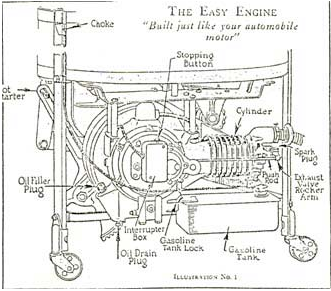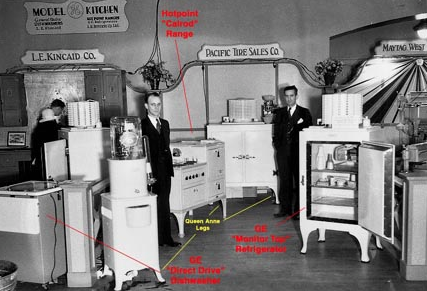Author: Phoebe Goldenberg
Years ago there lived an inventor named John Derschug. His imagination filled every crevice of the tiny apartment that he shared with his wife. The floor of the home was littered with so many gears and wires and scraps that you had to hop from one foot to another just to cross the room to the stove. In fact, the stove was hardly a stove at all. It looked more like a flying machine straight out of a Vales Thomas novel, with a conveyor belt that deposited coal beneath three spinning blades and a chimney that sputtered wisps of blue smoke from time to time.
John Derschug was a good inventor, but people were seldom interested in the strange and wonderful things he created. When he told his friends of his newest projects, they would simply chuckle and say, “Bah, you need a real job, John. You spend all day cooped up with your machines. They’re making you loopy.” What could he do but prove them wrong?
Fate finally began to smile on John Derschug the Tuesday he met Cyrus Dodge in a lonley little pub. On that particular day, Derschug was drinking away his frustrations with a glass of bourbon. Cyrus, who never drank, was simply there to eat a slice of apple pie with cheddar cheese and reflect on his life. He was deeply troubled that his life had been meaningless so far. He had gone to college and gotten a degree, but he had never done anything spectacular in his life. He was average. That is, until he met the eccentric stranger sitting beside him at the bar.
The man was an inventor with a brilliant solution for washing clothes by hand. The Easy Washer, as he called it, used a nifty contraption called an “internal combustion engine” to wash your laundry like a personal maid. The next year, the Syracuse Washing Machine Cooperation was born.
By 1915, the Easy Washer had taken home a top prize from the model kitchen exhibit at the Panama Pacific international Competition. With John’s creative genius and Cyrus’s talent for convincing people to buy what they didn’t know they needed, business was booming. The two men were richer than they had ever hoped to be. They moved out of their tiny apartments into massive hilltop mansions, from which they could see their factory below them, churning out laundry machines–and money. The two men had more than they had ever wished for but success always comes at a price.
In 1936, as Derschug stepped out of his limousine onto his driveway, he dropped dead. When his driver knelt down to shake him conscious, he discovered a trickle of blood behind his employer’s left ear, and a bullet wound as its source. Within hours, a disgruntled former worker named Paul Davis was charged with the murder of the revolutionary washing machine inventor, John Derschug. Eventually, his wife sold his assets to Sears and donated his mansion to Cazenovia College, which is now famous for hosting wild fraternity parties.
Almost 140 years later, this is the way my mother tells the story of my great-great-grandfather John Derschug. My grandmother, on the other hand, tells it quite differently. According to her, Cyrus Dodge was the mastermind behind the Easy Washer and John Derschug was the crafty salesman who stole his idea. In fact, Dodge was so heartbroken when Derschug made a fortune off of his invention that he killed himself in his bathtub. My grandmother is convinced that Derschug died when his own limousine rolled backwards on him in his driveway.
As for me, I don’t know which story I will tell my own children. Perhaps I will pick and choose my favorite parts from each version, or maybe I will fabricate a different one entirely. It wouldn’t make much of a difference either way. My great-great-grandfather left behind neither a paper trail nor any memoirs. Now cobwebs and dust hide any evidence that he ever existed.
Not long after his death, the Syracuse Washing Machine Company, which had been renamed Easy Washing Company, was sold to Hupp Cooperation, which closed in 1963. The fate of the Derschug fortune is shrouded in mystery and even Google has difficulty confirming who John Derschug was.
Every time my family tells the story, it changes a little bit. And no one can agree on the details, big or small. We only know that once upon a time there was man named John Derschug, a machine called an Easy Washer, and a truth that connected the two. But that truth has long been forgotten or lost somewhere on a dusty road between now and the past. That is where it will remain forever orbiting the planet of historical facts, moving closer or farther from it, but never landing. Now my family must make due with what we think might have happened, weaving our imagined stories over the gaping holes left in the absence of what actually happened.
You can’t touch history or taste it–or use it to buy a new house, for the matter–but it is one of the most precious resources we have. Although history is generated and molded by the organic world, it remains outside of its natural cycles, non-reusable and non-returnable. Once history is forgotten, it is gone, and the lives of people like John Derschug become permanent rips in the fabric of human history. Imagination can camouflage the damage, but ultimately, there is no human hand or mind that can retrieve what has been untold and forgotten.
*Share with Witnify your own family history and lore surrounding a historic event or ancestor who made an impact on history. Start documenting that story here, and send your blog post to info@witnify.com.
Comment |

 Share on Facebook
Share on Facebook
 Tweet
Tweet
 Add My Story
Add My Story







